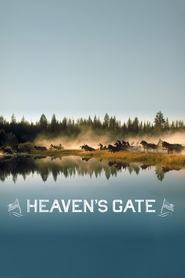I read in Steven Bach's Final CutThe Association valued its cattle holdings in 1885 was worth $100 million in dollars of the day: the equivalent of $3.2 billion in 2025.
Now I won't go all the way for this movie, but once you start to watch it as partly a musical, its longueurs start to make more sense: the protracted editing style seems to be a way to support the uninterrupted flow of the (often excellent) instrumental soundtrack.
Distance, maintained tonally rather than in the ratio of wide shots to close-ups, is the key to Cimino’s film. The director doesn’t quite reinstate the deceptive cleanness of Hollywood artifice that Altman, Peckinpah, and others stripped away from the western, but he does replace their tendency to wallow in frontier filth with an old-school nostalgia for American individualism.
— Joseph Jon Lanthier (Slant Magazine)
Among the few North American critics who liked Heaven’s Gate from the beginning was Robin Wood. It was Wood who first compared it to another wildly ambitious and very controversial epic film, D. W. Griffith’s Birth of a Nation. It is a comparison that still stands. The two films may be ideological opposites, but like Griffith, Cimino is not afraid to revisit America’s dark past and admit that it is an intrinsic part of this country’s DNA.[…]
Just a few months before Heaven’s Gate opened in New York, 1980 saw the release of Star Wars’s sequel, The Empire Strikes Back. Raiders of the Lost Ark came in 1981, the first year of the Reagan presidency. E.T. would land in theaters shortly after. Seen today, in its stark contrast to the Manichaean spirit of those two space sagas and Indy’s anti-Nazi comic-book adventure, Cimino’s dark, very untriumphant epic looks like a beautiful anachronism. And there is no doubt that the film paid dearly for its disconnect from the contemporary zeitgeist. Over three decades later, one hopes that Heaven’s Gate can be watched without the burden of prejudice that weighed on its original release. After all, when it first came out, people hated Moby-Dick too.
— Giulia D'Agnolo Vallan (Criterion)
In the first six days of shooting[,] Cimino had fallen five days behind. He had shot almost 60,000 feet of film had had approximately a minute and half of usable material, which had cost roughly $900,000 to expose.
— Steven Bach: Final Cut: Art, Money and EGO in the Making of Heaven's Gate (1999)
The trouble all along [according to Steven Bach] was that "there were no sub-plots [and] few characters subsidiary to the central trio," and that "the paucity of character and narrative detail was not enriched by the inundation of production detail [but] buried by it." The obvious re-editing strategy—in fact the only possible one—of paring away expensive "production value" in order to bring out the story line didn't strengthen the story line so much has expose it in all its thinness. Since Heaven's Gate had no basis for recovery, it never recovered
— Paul Thomas (Film Quarterly)
"We have to say no [to Huppert], and we have to mean no. It's going on too long. It's bad for the movie; it's bad for our relationship with Michael. If we capitulate of this issue, it's bad for us in the company, because I don't know how to justify this kind of wrongheadedness, and if we don't say no now and mean it, he'll have us on a goddamn pane to Paris to meet with her!" David nodded. "Let's call and tell him no. Nobody's going to Paris."The Concorde landed at Charles de Gaulle at ten-forty on a drizzly Sunday night in late February.
— Steven Bach: Final Cut: Art, Money and Ego in the Making of "Heaven's Gate" (1985)
Synopsis: Harvard graduate James Averill serves as the sheriff of prosperous Jackson County, Wyoming, standing at the center of a conflict between impoverished immigrants and affluent cattle farmers. Politically connected ranchers enlist mercenary Nathan Champion—who is also vying for the affections of local madam Ella Watson—to combat the immigrant uprising. As tensions escalate, both Averill and Champion start to question their decisions.

